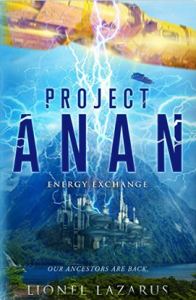★★★★
Project Anan by Lionel Lazarus is a compelling work of science fiction about two planets facing a crisis. On the one hand, the aliens called are facing an energy crisis of their own, while humans are facing an ecological crisis on Earth. The Anan are more than an alien race: they engineered the human race and so want to save us as well, and the question becomes if humans have enough sense of self-preservation to be able to work with creatures from another planet. Leaving Earth on a beat-up ship in search for a more hospitable home, humans may have to be the ones who come to the rescue. Project Anan asks a number of thought-provoking questions about life and its origins in this immensely readable and page-turning science fiction thriller.
Science fiction can shine a light on certain issues like no other genre can, and Project Anan is no exception. By no means does the book hit you over the head with issue-laden prose, but at times it is a serious foray into the problem of Global Warming (in which case Global Warming deniers may be put off), as well as war, population growth, and other apocalyptic problems. Sometimes the book is a satirical look at how humans face our problems, while still having an undercurrent of true concern, as the best satire should.
However, the shift in tone is not always as smooth as it should be, and sometimes strains credulity. When the Anan first land on Earth, they work with a project manager whose attitude is, more or less, “It’s just another job,” as she sets out to interview a couple of aliens from another world. It’s this broad-stroke tone that makes the book veer towards comedy at times, rather than satire, as most people would be completely floored when in the presence of aliens. Given the awe-inspiring nature of first contact, this reaction to the Anan is somewhat jarring.
Additionally, the aliens need for energy is left intentionally vague and kind of mystifying, and it’s this lack of attention to detail that gives the early part of the book a confusing mixture of tones. However, the novel picks up a lot after all the story elements are in place, even if the beginning is a bit rough around the edges. After the book finds its stride, it’s engaging and page-turning, and shows a better attention to detail.
Most of all the novel is eye-opening, in the sense that it reads like a fable as much as it does science fiction. The world of 2026 is not too removed from this one, so the story is at once far-fetched and completely recognizable, and shines and important light on issues we are now facing. The issue of alien contact might not be a pressing one, but it does say a lot about how humans face change and adversity. In other words, our reaction to an alien race might not be so different than our current reaction to Global Warming – indifference, anger, fear, and more. It’s an interesting and smart parallel Lazarus makes throughout the book.
Given that this is the first book in the series, it’s a solid foundation with a lot of threads still left unexplored, as the world of the Anan and humans is fairly epic. Once the ball gets rolling in Lazarus’ narrative, you’ll want to pick up the second book in the series.
Links
Author Site
Facebook
Amazon
Goodreads
Review Overview
Design
Editing
Content
Get an Editorial Review | Get Amazon Sales & Reviews | Get Edited | Get Beta Readers | Enter the SPR Book Awards | Other Marketing Services
























Leave A Comment